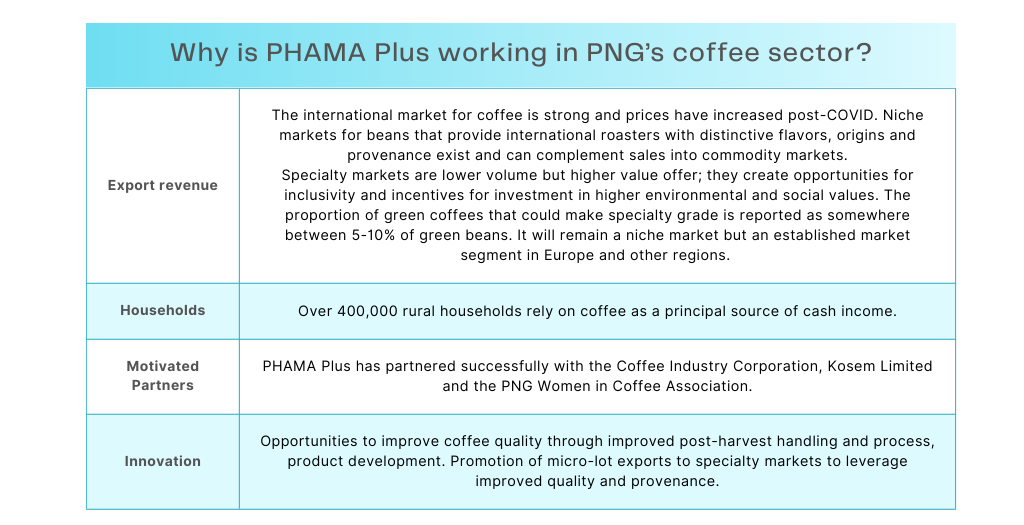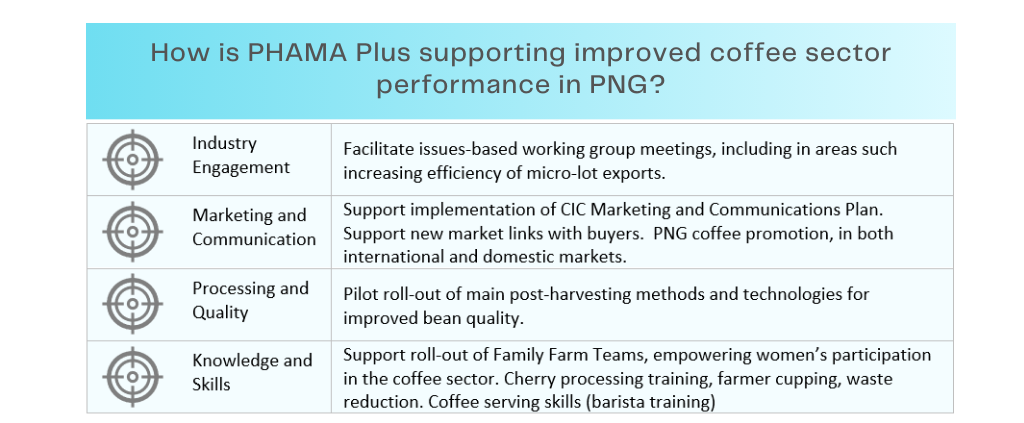PHAMA Plus works closely with the Papua New Guinea’s Women in Coffee Association (WICA) to brew a better future for PNG women in coffee. LEARN MORE
PHAMA Plus builds on the success of PHAMA in the coffee sector of Papua New Guinea (PNG) to increase the country’s global competitiveness and open new markets for high value trade.
Coffee is one the world’s most widely traded commodities and most valuable industries. About 70 countries produce and export coffee; most of these countries and all others consume it. In mature coffee-importing markets like Australia, New Zealand, the United States, Western Europe, and Japan, niches have developed reflecting the values of wealthy, sophisticated consumers who value quality, flavour, and intangibles like environmental stewardship and social equity over price.
This presents an opportunity to harvest additional value from coffee production by following certification schemes (e.g. Organic, Fairtrade, Utz/Rainforest Alliance), and the implementation of best practices necessary to achieve superior quality for specialty markets. Where certified stocks benefit from floor pricing during times of low market trading and small premiums for adhering to program practices, specialty coffees can sell for 1.5 times, 3times, 10 times the going rate for commodity coffee, or even more.
Specialty coffees (coffees differentiated by quality and terroir) are the fastest growing category of global production, presently accounting for approximately 15% of the global quantity of coffee, but more than 50% of the total value of coffee sold in the world’s largest market: America. Worldwide demand for specialty coffees continues to grow between 7-9% per annum. Growth in new coffee consumer markets of Asia (e.g. China, Korea), Eastern Europe and the Middle East additionally provide outlets for coffees of all qualities in markets receptive to new origins of supply. Despite short-term market fluctuations, long-term forecasts anticipate global consumption to outpace production in the next two decades, growing at approximately 1-2% per annum to exceed 200 million 60kg bags.
PHAMA Plus’s work in coffee began with the assembly of a nationwide group of private industry stakeholders representing all segments of the country’s coffee value chain from farming through export and retailing. The Coffee Industry Working Group (CIWG) also includes participation by public sector partners, including the Coffee Industry Corporation (or CIC, PNG’s government-established coffee authority), the Productive Partners in Agriculture Project (or PPAP, a World Bank and PNG joint project), and NGOs and certification authorities, such as Fairtrade International.


For more information, please reach out to PHAMA Plus Country Manager PNG – Sidney Suma on s.suma@phamaplus.com.au.
